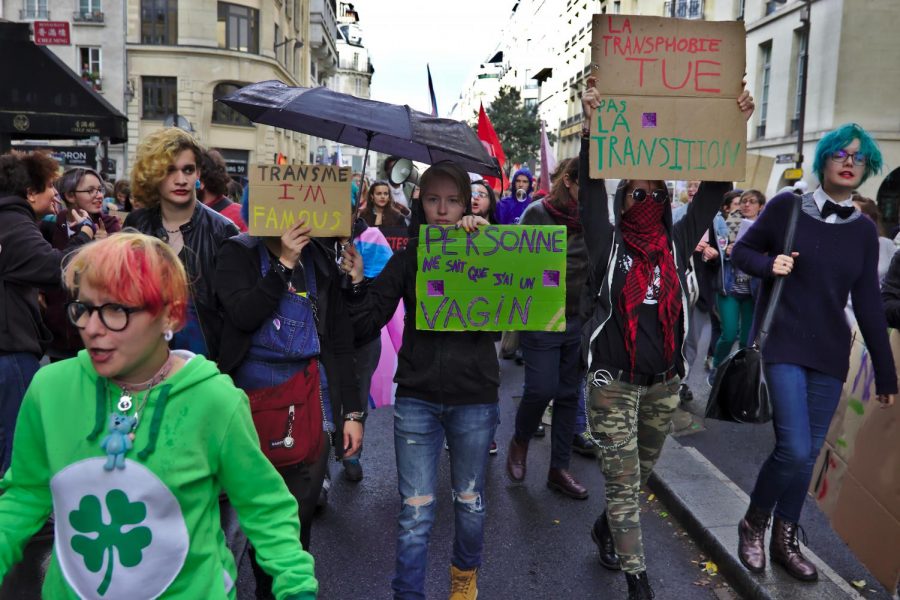Transphobic military—It’s not just Korea
Julie Missbutterflies from Lannion, France [CC BY-SA]
It is extremely crucial that these advancements do not regress.
January 30, 2020
South Korean army sergeant Byun Hui-su was recently discharged from her position after undergoing gender confirmation surgery. When I first heard this story, my reaction was something along the lines of, “I can’t believe how easy it is to forget that in so many parts of the world, forces are intently against people’s right to simply exist as themselves.” Upon further research, however, I discovered familiar undertones, reminding me not to exclude our own nation from “so many parts of the world.”
This is the first time a military panel has had to determine whether or not an active duty soldier would be allowed to keep their position after transitioning. The story has brought up a number of unanswered questions regarding the place of the LGTBQ+ community in Korean society. Really, the continued existence of conversations debating which humans deserve human rights seems nightmarishly tyrannical, but here we are.
The South Korean Conscription requires all male citizens to perform two years of military service and enlist before the age of 28. While some seek ways to avoid their service, Byun says it was always her dream to join the army and be stationed at the North/South Korean border. She enlisted as a male citizen in 2017 and worked primarily as a tank operator, claiming to have earned the highest score among her battalion staff sergeants in an official tank driving skills assessment. Let’s stop here to applaud the soldier on her hard work and dedication to her country since it doesn’t seem like anyone else intends to.
However, throughout her time in the military, Byun experienced severe depression and dysphoria from having to keep her gender suppressed for so long. When she finally came out, Byun says her unit was supportive and knowingly approved her request to use her leave to travel to Thailand for the surgery. Here, I present to you an appropriate response to the situation.
On returning, the sergeant was greeted with the news that the government intended to remove her from her duties. Enlisted South Korean soldiers must undergo a physical exam to determine if they are suited for military service. The exam is on a grading scale from 1-7. A grade of 6 labels the citizen as “incapable of performing military service due to any disease or mental or physical incompetence.” The result of receiving this assessment is an exemption from military service. It is under this exam that the “partial or complete removal of genitals” is considered grounds for dismissal. This policy was used to justify ordering the discharge of Byun by Jan. 24. And here, your example of what not to do.
Byun is now suing the military, hoping to create a place for people like herself in Korean society, and she’s not alone in her efforts. Rights activist Lim Tae-hoon and head of the Trans Liberation Front advocacy group, Kim Kyeoul, have both spoken out in support of her and against the discriminatory military.
And they are right; it is outright discrimination. Unfortunately, South Korea’s anti-discrimination law set for the LGBTQ+ community does not prohibit discrimination on the grounds of sexual orientation or gender identity. Additionally, same gender couples are not allowed to get married or have children. Transgender citizens may apply to legally correct their gender-on-file, but in order to undergo surgery, they must be over 20 years of age, single and without children.
It is currently illegal for a transgender person to join the military in South Korea. Recall that last year, the Trump administration reversed President Obama’s 2016 policy that allowed transgender people to serve openly in the military without fear of being discharged and to receive medical care to transition.
The United States is generally understood to be one of the most socially progressive nations in the world. It makes sense, considering the relatively young country has such a uniquely diverse population. Generations of immigrants have amalgamated into a society with no single common heritage, culture or belief. For one such society to coexist, the individuals within it must find ways to live peacefully among themselves without ever necessarily fully understanding each other. That pursuit has led to numerous advancements made on behalf of all sorts of social minority groups.
It is crucial that these advancements do not regress.
I find it important to periodically consider the way of life we have normalized in terms of what the rest of the world is experiencing. I’d like to think this reflection might bring to light the unfortunate frequency that we are able to see ourselves in the notoriously socially conservative nations still defending their rights to act on their prejudices.
Editor’s note: The author of this piece asked for their name to be removed due to safety issues following their graduation.








